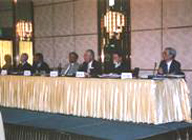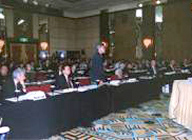November 1-2, 2007
| Date | November 1-2, 2007  |
|---|---|
| Venue | Hotel New Otani Chang Fu Gong 26 Jian Guo Men Wai Avenue Beijing, China TEL: (8610) 6512-5555 FAX: (8610) 6513-0868 |
| Co-hosted | Japan Economic Foundation(JEF) Jiji Press Bldg. 11F, 5-15-8 Ginza Chuo-ku, Tokyo 104-0061 Japan TEL: (81-3) 5565-4824 FAX: (81-3) 5565-4828 URL: http://www.jef.or.jp Academic Division of International Studies, Chinese Academy of Social Sciences (ADIS CASS) 3 Zhang Zizhong Rd., Beijing 100007 China TEL: (86-10) 6406-3922 FAX: (86-10) 6406-3041 |
Topics"A New Age of Trade in Asia"
Session 1: The recent FTA movements in the East Asia region and future prospects towards an integral FTA in the region
Session 2: How should we deal with the different proposals towards an integral FTA in the East Asia region as a whole?
Session 3: The Korea-US FTA and its implications to East Asia and Europe
ParticipantsList
SummarySummary
Chairman's SpeechOpening remarks by Mr. Hatakeyama (November 1, 2007 @JEF-ADIS CASS International Symposium)
Prof. Zhang Yunling, Director of Academic Division of International Studies, Chinese Academy of Social Sciences, distinguished guests, ladies, and gentlemen:
It is my great honor and privilege to welcome all of you to the International Symposium, "A New Age of Trade in Asia", co-hosted by Academic Division of International Studies, Chinese Academy of Social Sciences and my organization, Japan Economic Foundation.
In March 2003, JEF organized the first international symposium in Singapore jointly with SIIA (Singapore Institute of International Affairs), focusing on a region-wide FTA in East Asia. Since then JEF has held the symposium in Bangkok, Manila, Seoul, and Jakarta respectively with the cooperation of a think tank or university of each country.
Since JEF started this symposium four and half years ago, there have been the following noticeable changes taking place in East Asia.
Firstly, the number of FTAs in this area, both bilateral and regional, increased remarkably including ASEAN-China FTA, ASEAN-Korea FTA. ASEAN-Japan FTA is to be signed this month in Singapore.
In March 2003 when we organized the symposium in Singapore for the first time, there were only 7 such FTAs. As of now there are more than 30 FTAs in which at least one East Asian country is involved. More FTAs are under negotiations.
Secondly, a feasibility study report on EAFTA was submitted in July last year under the chairmanship of Mr. Zhang Yunling, who is our counterpart this time. The core of this report was that an independent process to form an EAFTA consisting of ASEAN +3 could be launched in 2007.
Thirdly, Japan proposed to start feasibility study on Comprehensive Economic Partnership in East Asia (CEPEA), consisting of ASEAN +6, on which the leaders agreed to launch a Track Two study among East Asia Summit participants.
Fourthly, the US has expressed interests in integral economic arrangements in this region. At the APEC Economic Leaders' Meeting in Hanoi in November last year, the idea of FTA AP was proposed with the strong initiative of the US. The leaders instructed their officials to undertake further studies on this idea as a long term prospect. In June this year, the US and Korea signed a free trade agreement. This KORUS FTA is expected to have significant implications for trade and investment in this region.
I hope that this symposium will discuss those issues I mentioned above, including "How should we deal with the different proposal towards an integral FTA in the East Asia region as a whole?".
On this note, I would like to take this opportunity to express my heartfelt gratitude to Prof. Zhang Yunling, all the distinguished speakers and the panelists and you, the participants for making this symposium realized.
Finally, I would also like to thank all staff of ADIS, CASS which has greatly contributed to this symposium. I wish all of you an interesting and fruitful discussion.
Thank you very much.
2016. NOVEMBER 2015. NOVEMBER 2014. NOVEMBER 2013. NOVEMBER 2013. FEBRUARY 2011. OCTOBER 2010. OCTOBER 2009. SEPTEMBER 2008. OCTOBER 2007. NOVEMBER 2006. NOVEMBER 2005. OCTOBER 2005. FEBRUARY 2004. JANUARY 2003. MARCH
